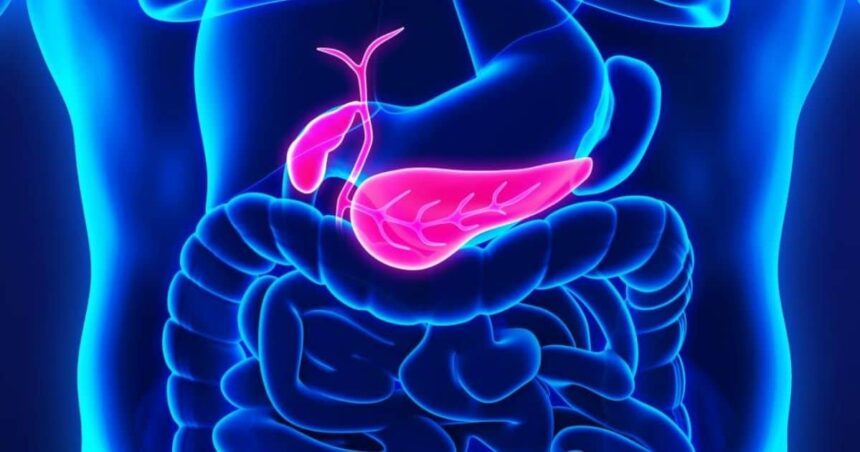Some of the widespread questions folks ask upon a analysis with kind 1 diabetes is, “can I simply get a pancreas transplant?”.
This query is usually very sophisticated and traditionally talking, pancreas transplants haven’t been really helpful as a primary course of therapy for kind 1 diabetes for lots of causes.
This text will clarify precisely what a pancreas transplant is, what the repercussions are, and can spotlight the tales of a number of individuals who have had this surgical procedure performed and can dig into what their lives seem like at present.
What’s a pancreas transplant?
Like another organ transplant surgical procedure, a pancreas transplant is a process the place a recipient with out a working pancreas (like somebody with kind 1 diabetes) receives a donated pancreas from a deceased individual.
The pancreas is a small organ that lies behind the decrease a part of the abdomen. Certainly one of its core capabilities is insulin manufacturing, which helps to control blood sugars and the absorption of glucose into cells.
Most pancreas transplants are performed on folks with kind 1 diabetes, though it isn’t really helpful except the affected person is affected by extreme problems of diabetes (corresponding to kidney illness requiring a transplant as nicely), because of the important uncomfortable side effects to at least one’s well being {that a} main organ transplant may cause.
Why is a pancreas transplant performed?
A majority of sufferers receiving a pancreas transplant are these with is extreme hypoglycemia unawareness. In actual fact, 93 % of sufferers are T1D.
As well as:
- Individuals with diabetes whose blood glucose ranges will not be managed with commonplace therapy, regardless of superior affected person training and self-care, could also be candidates for transplantation
- Sufferers who even have extreme renal illness needs to be thought-about for mixed transplantation of the kidneys and pancreas as a result of most individuals with kind 1 diabetes who bear solely renal transplantation will present proof of renal injury inside 2 years
- Lastly, some sufferers with kind 2 diabetes are eligible, however provided that their diabetes is extreme, they’re regular weight, lack endogenous insulin manufacturing, and have low resistance to insulin peripherally
What are the dangers of the process?
Having a pancreas transplant is taken into account main surgical procedure, and carries a danger of great problems, together with:
- Blood clots
- Bleeding
- An infection
- Urinary tract infections
- Hyperglycemia
- Failure of the donated pancreas
- Rejection of the donated pancreas
Will a pancreas transplant remedy diabetes?
By definition, when you obtain a pancreas transplant, you’ll not have scientific signs of diabetes and can not must inject insulin.
There are, nonetheless, many uncomfortable side effects of getting a significant organ transplant.
With any organ transplant, it’s essential to attenuate the chance of your physique rejecting the donated organ. Within the case of a pancreas transplant for Kind 1 Diabetes, there are two driving forces that increase the chance of rejection:
- the human physique’s immune system tends to assault any international organ, and
- an individual with kind 1 diabetes already has an immune system that’s liable to attacking the pancreas, since that’s what led to the situation within the first place.
Subsequently, transplant sufferers are REQUIRED to take anti-rejection medicine (that suppresses the immune system) for the remainder of their lives, which can trigger critical uncomfortable side effects and might be expensive and tough to handle.
Brandon Mouw, who previously had kind 1 diabetes, obtained a pancreas transplant two years in the past after affected by difficult-to-control diabetes and hypoglycemia unawareness for years.
He put it eloquently, saying, “Administration at present is taking sturdy immunosuppressants twice a day, having weekly blood work, managing medicine uncomfortable side effects, and being cautious of what I do and eat due to having a particularly suppressed immune system. Moreover, I’ve power delicate rejection and have an in depth eye saved on me. I used to be within the hospital over Thanksgiving for a 5-day infusion to suppress my immune system additional as a result of my physique was preventing the transplant.”
“I have a look at it like I switched diabetes administration with transplant administration. I’m not an insulin-dependent diabetic. My diabetes just isn’t cured as a result of I am going proper again to being a brittle diabetic if the transplant fails. I have a look at it as a pause in my diabetes. I nonetheless have 31 years of diabetes in my life, and it’s solely been two years for the reason that transplant.”
What are the anti-rejection medicine uncomfortable side effects?
After the pancreas transplant is carried out, the affected person would require anti-rejection medicine for the remainder of their life, which might have the next uncomfortable side effects:
- Threat of an infection
- Pores and skin most cancers
- Lymphoma
- Tremor
- Complications
- Osteoporosis
- Weight achieve
- Water retention and puffiness
- Extreme hair loss or progress
- Pimples
- Sensitivity to gentle
- Excessive ldl cholesterol
- Hypertension
- Nausea, diarrhea, and vomiting
Anti-rejection medicine primarily suppresses one’s immune system, making the affected person extra inclined to infections and infectious illnesses. All immunosuppressant medication can be found solely by prescription out of your physician and are available as tablets, capsules, liquids, or injections.
The purpose of anti-rejection medicine is to search out the therapy plan that can suppress your immune system adequately to just accept the brand new organ whereas having the least dangerous uncomfortable side effects.
In case you’re an organ recipient, even the slightest change from the dosing of your medicine or a missed dose can set off an organ rejection. Name your physician immediately if this occurs.
Karin Hehenberger has lived with each a kidney and pancreas transplant for the previous 12 years. She says that any medicine uncomfortable side effects, for her, have been minimal and fully price it.
“I might do it once more tomorrow. Even when I hadn’t had the kidney transplant. I don’t have to fret about going low, going excessive, diabetes problems, computing [what I eat and how to dose] on a regular basis. I get up with a smile, as an alternative of waking up and being concerned. I can tackle challenges that I wouldn’t have had the power to tackle earlier than. I had a child woman just a few years in the past, and I’ve extra power for my complete life, versus earlier than once I needed to give attention to what my power ranges allowed me to include. In my case that meant that work was a precedence and my social life suffered.”
What occurs after the transplant is full?
After a profitable pancreas transplant, the brand new pancreas will make the insulin your physique wants, so that you’ll not require insulin injections to deal with kind 1 diabetes.
You will have to maintain an in depth watch on staying wholesome, taking anti-rejection medicines as prescribed, and hold a lookout for any indicators of organ rejection, which embrace;
- Stomach ache
- Fever
- Dehydration
- Extreme sensitivity on the transplant web site
- Hyperglycemia
- Physique aches
- Vomiting
In case you expertise any of those signs after transplant surgical procedure, search emergency medical consideration, and name your physician instantly.
It’s common for pancreas recipients to expertise an acute rejection inside the first few weeks or months after surgical procedure. In case you do, you’ll want emergency medical therapy with intensive anti-rejection medicines.
Life after a pancreas transplant
Life after a pancreas transplant varies by affected person, however one factor is for certain: you’ll not have kind 1 diabetes, which appears like a dream to many sufferers.
Nevertheless, rejection of the brand new organ is widespread: Based on the Mayo Clinic, pancreas rejection charges are usually barely greater amongst pancreas-only transplant recipients than sufferers who obtain each a brand new kidney and pancreas on the identical time (on account of kidney failure on account of diabetes). Hold an in depth look ahead to indicators of organ rejection.
In case your new pancreas fails, you may resume insulin remedies and think about a second transplant. The choice to bear a second transplant is extraordinarily private and sophisticated and relies on your present well being standing and well being and life objectives.
It’s additionally vital to take care of a wholesome way of life together with your new organ and to assist defend your immune system, which can be suppressed with the anti-rejection medicines. Make sure to:
- Train often (make sure you examine together with your transplant group earlier than starting any train routine post-surgery)
- Preserve a nutritious diet with loads of fruits, greens, lean proteins, wholesome fat, and fiber
- Drink loads of water
- Take all anti-rejection medicine as prescribed
- Defend your immune system and keep away from individuals who have viral or bacterial infections or colds
- Wash your palms often and put on a face masks when in crowded, public areas
- Handle stress
- Get loads of sleep
- Search group assist from different organ transplant recipients to create a group
Karin says that one factor she needs she had entry to proper after the transplant was a group of individuals going via the identical factor.
“I had entry to one of the best care, however didn’t have the reference to one other affected person. I want I had some group. Connecting with others who’ve been the place you’re proper now could be invaluable. Don’t simply discuss to medical doctors, discuss to different sufferers to higher set your expectations.”
She was so motivated to assist others going via the identical factor that she launched her personal web site, www.transplantlyfe.com the place folks awaiting organs, those that have just lately had a transplant, donors, caregivers, and household can go and search assist.
Each recipients, nonetheless, have a newfound outlook on life:
Brandon says, “The most important change has been my gratefulness for all times. Little issues don’t trouble me anymore. I owe a lot to so many individuals and I give again by sharing my story, elevating consciousness, and ensuring I do all I can to take advantage of out of day-after-day.”
Karin provides, “I’ve one very vivid reminiscence, once I knew all the pieces was instantly completely different: I had a cappuccino and biscotti and was strolling down the road in New York Metropolis, and simply thought, ‘wow, I can try this with out fascinated about carbohydrates or bolusing!’” Having a pancreas transplant has given me a approach to reside with out the glucose fluctuations, feeling dangerous more often than not, and particularly with out the worry. And I’m grateful for that.”












